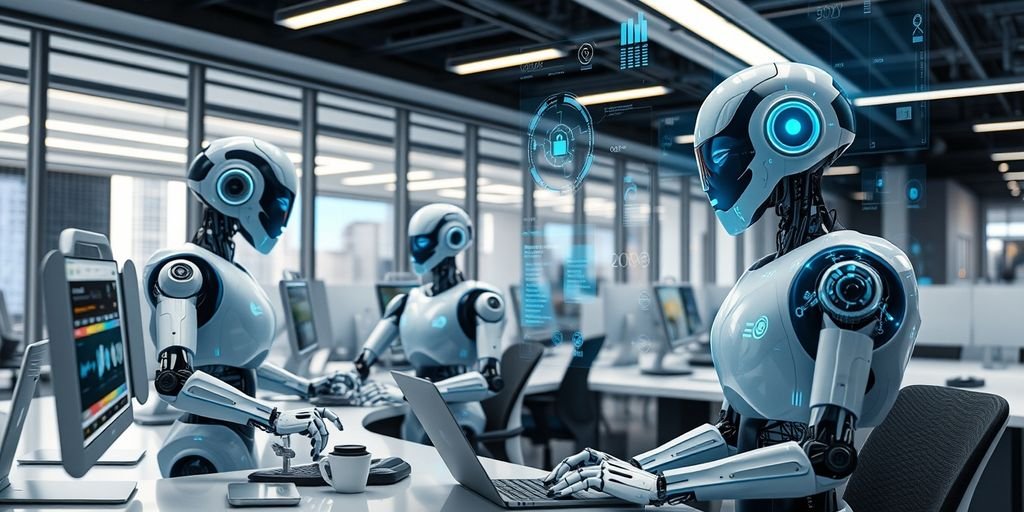In the ever-evolving landscape of artificial intelligence, AutoGPT emerges as a groundbreaking open-source application, revolutionizing the way we interact with and utilize AI. Powered by the advanced capabilities of GPT-4, AutoGPT introduces a novel concept of AI agents that operate autonomously, executing tasks with unprecedented efficiency and intelligence. Imagine AI ‘agents’ that not only follow commands but also think, plan, and execute tasks autonomously. This article will explore the core features of AutoGPT, its implementation in business operations, and the future of autonomous AI agents.
Key Takeaways
- AutoGPT leverages GPT-4 to enable AI agents that think, plan, and execute tasks autonomously, offering unprecedented efficiency and productivity.
- Implementing AutoGPT in business operations can revolutionize various industries by automating routine activities and solving complex problems independently.
- The future of autonomous AI agents like AutoGPT holds promise for further advancements, significant impacts on the workforce, and important ethical and regulatory considerations.
Understanding AutoGPT and Its Core Features
AutoGPT represents a significant advancement in artificial intelligence, marking a new era of AI interaction and autonomy. This innovative tool is built upon the advanced GPT-4 language model, which is at the core of its capabilities. The primary allure of AutoGPT lies in its unique ability to simplify and automate complex tasks using AI agents. These agents are distinct from traditional AI models due to their autonomous nature and goal-oriented design.
What is AutoGPT?
AutoGPT is a generative AI that doesn’t need a user for most things. It leverages the power of GPT-4 to perform tasks autonomously, making it a groundbreaking tool in the AI landscape. AutoGPT’s autonomous agents can handle a wide range of tasks, from data analysis to content creation, without requiring constant human intervention.
Key Features of AutoGPT
AutoGPT boasts several unique features that set it apart from other AI models:
- Multimodal Capabilities: AutoGPT can process and generate text, images, and other data types, making it versatile for various applications.
- Autonomous Task Execution: It can perform tasks without human input, streamlining operations and increasing efficiency.
- Advanced Problem-Solving Skills: AutoGPT can tackle complex problems by breaking them down into manageable steps.
- Audit Logs: Provides detailed logs for transparency and accountability.
- Easy API Deployment: Simplifies the integration of AI functionalities into existing systems.
How AutoGPT Differs from Traditional AI
Traditional AI models often require significant human oversight and intervention. In contrast, AutoGPT’s autonomous, goal-oriented, and multi-purpose capabilities allow it to perform multiple tasks simultaneously. This open-ended nature makes it an exciting prospect for developers and businesses looking to innovate and streamline their operations.
As the project matures, it could become an invaluable tool for developers, businesses, and the general public.
Implementing AutoGPT in Business Operations
Setting Up AutoGPT for Your Business
Setting up AutoGPT for your business involves several key steps. First, you need to identify the specific tasks and processes that can benefit from automation. Next, configure the AI to handle these tasks autonomously. Ensure that your team is trained to work alongside AutoGPT to maximize its potential. Finally, continuously monitor and adjust the AI’s performance to align with your business goals.
Use Cases of AutoGPT in Various Industries
AutoGPT is a versatile tool with a wide range of applications. In the retail sector, it can manage inventory and optimize supply chains. In healthcare, it can assist in medical diagnosis and patient management. Human resources departments can benefit from the implementation of AutoGPT and self-replicating AI agents through the automation of tasks like applicant screening and onboarding.
Challenges and Considerations
While AutoGPT offers numerous benefits, there are challenges to consider. Data privacy and security are paramount, as the AI will have access to sensitive information. Additionally, the initial setup and training can be resource-intensive. Businesses must also stay informed about ethical considerations and emerging trends to ensure successful implementation.
The transformative power of AutoGPT in business operations cannot be overstated. As the technology matures, it will become an invaluable tool for optimizing various aspects of business management.
The Future of Autonomous AI Agents
Potential Developments in AutoGPT
As AI technology evolves, autonomous AI agents are expected to become more advanced and more critical to the development of AI. By enhancing AI systems’ capacity to operate independently and make rational decisions, we are inching closer to achieving AGI and unlocking new possibilities for innovation and collaboration between humans and machines.
Impact on the Workforce
The future is going to be full of AI agents, but there are still a lot of open questions on how to get there & what that world will look like. AI agents like AutoGPT will play an even greater role in our lives moving forward. This shift will inevitably impact the workforce, leading to both opportunities and challenges. While some jobs may become obsolete, new roles centered around AI management and oversight will emerge.
Ethical and Regulatory Implications
The potential of AutoGPT and other autonomous AI agents to revolutionize the way we interact with technology is exciting. However, it is essential to consider the potential societal and ethical implications of this technology and ensure that it is developed responsibly. Regulatory frameworks will need to evolve to address issues such as data privacy, security, and the ethical use of AI.
The prospect of collaborating with AI Agents opens doors to unprecedented possibilities.
Conclusion
In conclusion, AutoGPT stands as a transformative force in the realm of artificial intelligence, offering unprecedented capabilities through its autonomous AI agents. By leveraging the advanced functionalities of GPT-4, AutoGPT not only automates tasks but also brings a new level of intelligence and efficiency to business operations. As businesses continue to integrate this groundbreaking technology, the potential for innovation and productivity gains is immense. AutoGPT is not just a tool but a revolutionary platform that promises to redefine the future of work, making it an indispensable asset for forward-thinking enterprises.
Frequently Asked Questions
What is AutoGPT and how does it work?
AutoGPT is an experimental AI-powered program developed by Toran Bruce Richards that autonomously develops and manages businesses to optimize net worth. It leverages the advanced capabilities of the GPT-4 language model to operate entirely on its own, performing tasks from start to finish without human intervention.
What are the key features of AutoGPT?
AutoGPT’s key features include autonomous task execution, advanced problem-solving capabilities, and the ability to think, plan, and execute tasks independently. It revolutionizes task automation by seamlessly handling a wide array of tasks, from routine activities to complex problem-solving scenarios.
How can businesses implement AutoGPT?
Businesses can implement AutoGPT by first setting up the AI system according to their specific needs. This involves configuring the software, integrating it with existing business processes, and training the AI agents to understand and execute tasks relevant to the business. AutoGPT can be applied across various industries, including finance, healthcare, and marketing, to improve efficiency and productivity.



